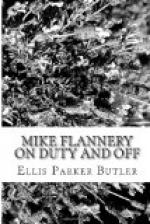Mike Flannery brought his hand down on the book he held, and the three men, who had been watching him with a fascinated stare, jumped nervously.
“That’s what Congress says,” said Flannery, glaring at the professor, “but up jumps th’ Sinator from Californy. ‘Stop!’ he says, ’wait! ’T is all right enough for th’ East t’ rule out th’ flea, but th’ Californian loves th’ flea like a brother. We want free fleas.’ Then up jumps th’ Sinator from New York. ‘I don’t object t’ th’ plain or crude flea comin’ in free,’ says he, ‘for there be need of thim, as me frind from th’ West says. What amusement would th’ dogs of th’ nation have but for th’ flea?’ says he. ‘But I am thinkin’ of th’ sivinty-three theayters on an’ off Broadway,’ says he. ‘Shall th’ amusemint industry of th’ metropolis suffer from th’ incoming of th’ millions of educated an’ trained fleas of Europe? Shall Shakespere an’ Belasco an’ Shaw be put out of business by th’ pauper flea theayters of Europe? No!’ says he. ‘I move t’ amend th’ tariff of th’ United States t’ read that th’ duty on insects, not crude, be one fourth of a cent per pound an’ tin per cint. ad valorum,’ he says, ‘which will give th’ dog all th’ crude fleas he wants, an’ yit shut out th’ educated flea from compytition with grand opera an’ Barnum’s circus.’ An’ so ’twas voted,” concluded Mike Flannery.
Monsieur Jules fidgeted and looked at his watch.
“Be easy,” said Flannery. “There’s no hurry. I’m waitin’ for a frind of mine, an’ ‘t is fine t’ talk over th’ tariff with educated min once in a while. Th’ frind I’m lookin’ for anny minute now is a fine expert on th’ subject of th’ tariff himself. O’Halloran is th’ name of him. Him as is th’ second deputy assistant collector of evidence of fraud an’ smugglin’ in th’ revenue service of th’ United States. ’T was a mere matter of doubt in me mind,” said Flannery, easily, “regardin’ th’ proper valuation of th’ professor’s fleas. I was thinkin’ mebby one dollar was not enough t’ pay for a flea, not crude, so I asks O’Halloran. ’’T will be easy t’ settle that,’ says O’Halloran, ‘for th’ value of thim will be set down in th’ books of th’ United States, at th’ time whin th’ professor paid th’ duty on thim. I’ll just look an’ see how much th’ duty was paid on,’ says he. ‘But mebby th’ professor paid no duty on thim,’ I says. ‘Make no doubt of that,’ says O’Halloran, ‘for unless th’ professor was a fool he would pay th’ duty like a man, for th’ penalty is fine an’ imprisonmint,’ says O’Halloran, ‘an’ I make no doubt he paid it. I will be out Sunday at four,’ says O’Halloran, ‘an’ give ye th’ facts, an’ I hope th’ duty is paid as it should be, for if ’t is not paid ‘t will be me duty t’ arrest th’ professor an’—’”
Flannery stopped and listened.
“Is that th’ train from th’ city I hear?” he said. “O’Halloran will sure be on it.”
The professor arose, and so did the two friends who had come with him to help him carry home the one hundred dollars. The professor slapped himself on the pockets, looked in his hat, and slapped himself on the pockets again.




